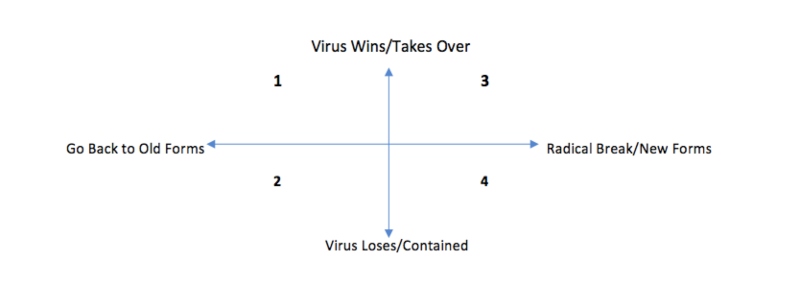Lessons from Lockdown:
Scenario planning for an unknown future
What will your church look like after the pandemic is over? Darren Blaney highlights different scenarios to consider

A few weeks ago, the United Reformed Church released a helpful document on its website. Called Ready for the “New Normal”, it outlines many of the issues and challenges that churches will have to face when they finally begin to emerge from the current crisis. Amongst its many provocative thoughts is this one;
“We know that even before coronavirus, numbers attending worship were steadily falling in almost all of our churches. We don’t assume that there was anything that you were doing that was putting people off, but might the opposite be true: if you do things differently, you might start to attract others who were not previously attending worship?... We might need to identify which things we should give up permanently – or at least for another season – in order to create space, time and energy to do new things, or to do some of our old things differently.”
Some people in my own fellowship have begun to ask similar questions. As one lady put it, “We have been given an opportunity which has never arisen before – the chance to begin again from scratch.” She then added. “We have a choice, to go back to what we were doing before, or to seek God’s will for us and consider prayerfully what activities and meetings will restart, and in what form.”
This type of talk is challenging; but what if such voices are right?
One tool that I have found helpful in thinking about all this is called Scenario Planning. This is how I have been using it in regard to this particular issue.
1. Take any two variables that you think might powerfully impact your future.
There could be a host of things we could consider. For the moment, let us consider the two variables already mentioned: the virus itself and the competing forces within the church of those who want to go back to how things were and those who see this as a chance for a completely new start.
2. Consider the possible extreme outcomes 12-18 months down the road.
So, with the virus this means either, a) we get the outbreak under control, or b) we do not.
Under a) this would mean, possibly, that a vaccine is developed, or that R0 (infection rate) drops significantly.
For b) it means that no vaccine arrives and that as soon as we seek to come out of lockdown the R number climbs above 1 again.
For the competing forces within church, one outcome would be that we are able to go back to how things were before the outbreak. The other would be that a complete break with the past is made, the church reinvents itself and new forms emerge.
3. Assemble these on a 2 by 2 grid.
If we put these four outcomes together on a grid, we get something like this.

Thus, four distinct scenarios emerge:
-
Virus Wins/Takes Over + Church Goes Back to Old Forms
-
Virus Loses/Contained + Church Goes Back to Old Forms
-
Virus Wins/Takes Over + Radical Break/New Forms of Church
-
Virus Loses/Contained + Radical Break/New Forms of Church
4. Describe what each scenario might look like, how we may have got there, and what its challenges might be.
In our case, we end-up with something like the following.
Scenario 1: Abandonment.
In this future scenario people decide that with no visible progress being made against the virus, they have had enough. The government realises that the economy cannot remain on pause any longer nor schools remain closed indefinitely. Society has to restart whatever the risks before it starts to unravel. The attitude of Christians becomes “If we’re going to catch this anyway, we might as well catch it worshipping God”.
Some churches meet with strict social distancing rules. This alters the experience of gathered worship and fellowship profoundly. Many cannot cope. Some abandon the restrictions and just ‘do church’.
If the virus is not contained, this outcome becomes a scary possibility.
Scenario 2: The Old World.
This is the case that many in our churches would like to see. The virus burns itself out or is brought under control; churches reopen; society returns to normal. This all becomes a nightmare few months that is consigned to history and we get to tell our grandchildren about it one day.
Scenario 3: Crazy New World
Here the virus runs rampant, but churches decide not to return to physically gathered Sunday services. Instead, internet meetings are the new norm. Other changes come with this. As the URC document says, “online worship… is a very different experience to simply streaming our “standard” services.” Churches adapt to this and online services develop their own style and liturgy. These make the most of the new technologies whilst minimising the downsides. What emerges is anything but “Sunday as usual”. Churches broadcasting on Youtube or Facebook Live, add an after-service Zoom-type component so that people can have some experience of connection and community.
Many house groups also move to meeting online. Churches work to develop virtual versions of pastoral care, children’s and youth work, even Messy Church. A lot of creativity and innovation is needed…and released. Fear and uncertainty is replace by faith and excitement. Online outreach is also developed, and an online mentoring culture begins to emerge.
With little use for buildings, some churches wonder what to do with them. Others, deprived of the money from community hire, struggle to meet their budgets. Some small churches abandon their properties altogether and discover a new lease of life as online and home-based communities. Others are unable to adapt and close.
However, in this new online world, the danger of people ‘consuming’ Christianity as another product emerges. Doing community and discipleship become priorities. Sadly, those with no internet access, which is especially true of some of the elderly, are now all but excluded from church life. Technical poverty becomes spiritual isolation.
Scenario 4: Mixed Economy
Churches are able to resume public meeting, but things do not go back completely to how they were before. Many aspects of church life continue online; many others are offered as both real-world and virtual-world experiences. Many of the problems around community and discipleship from scenario 3 are present here too. The additional challenge emerges of how to combine online and real-world congregations into one fellowship. Some manage this, others live with the tension, and some others diverge to the point of separation.
Helpful Dreams
Of course, no-one knows how these things will pan out. Only God does, and we trust in His sovereign grace to fulfil His purposes. None the less, I have found this exercise useful. I commend it to you. It is a practical way of gaining a ‘heads up’.
It has enabled me to see some of the potential issues, challenges, and opportunities that God may have for us down the road. Above all it has reassured me that we have nothing to fear if are willing to surrender ourselves whole-heartedly to our Lord. In the words of the popular song Father and Son, we will still be here tomorrow, but all our dreams (and ideas about church) may not.
Jesus will continue to build His church, whatever it may look like after lockdown is over.
Darren Blaney is minister of Herne Bay Baptist Church
Images | Daniel McCullough | Unsplash
Do you have a view? Share your thoughts here.
Baptist Times, 29/05/2020